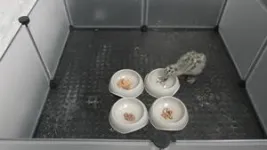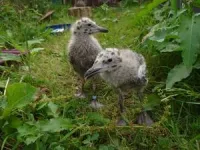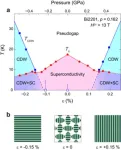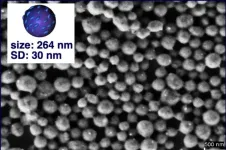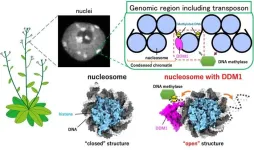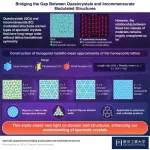(Press-News.org) Seagull chicks raised on an “urban” diet still prefer seafood, new research shows.
University of Exeter scientists studied herring gull chicks that had been rescued after falling off roofs in towns across Cornwall, UK.
Raised in captivity (before being released), they were given either a “marine” diet consisting mainly of fish and mussels, or an “urban” diet containing mostly bread and cat food.
Every few days the gull chicks were presented with a choice of all four foods in different bowls, to test which they preferred – and all gulls strongly favoured fish.
“Our results suggest that, even when reared on an ‘urban’ diet of foods found only around people, these chicks might be unlikely to seek out urban foods as adults,” said lead author Emma Inzani, from the Centre for Ecology and Conservation on Exeter’s Penryn Campus in Cornwall.
“Human-associated foods are often both reliably present and easy to obtain – but when fish is available they clearly prefer it.”
Herring gulls are often seen as a pest in urban areas, where they scavenge for dropped food and in bins, and sometimes take food from people.
However, the species is on the UK’s List of Highest Conservation Concern due to ongoing population declines.
Inzani said a combination of reduced fish stocks in UK waters – coupled with abundant and easy access to food waste in towns – may mean it is not as profitable for gulls to spend a lot of energy going out to sea to forage.
Previous research has shown that parent gulls often switch to finding more seafood once their chicks hatch, possibly due to seafood providing more of the nutrients chicks need to grow.
In this new study, all 27 chicks had access to food all day, but half of the chicks had urban food for 80% of the day and seafood for 20%, while the other half of the chicks received the opposite diet.
When presented with all four foods together on days 5, 10, 15 and 35 of the study, both groups consistently favoured fish – and even those that tried the bread rarely ate much of it.
Chicks’ preferences for fish found in this study may reinforce the behaviour observed in parent gulls to switch to provisioning more marine-sourced foods upon chick hatching.
“Animals can live and exploit urban areas for human food waste,” said senior author Dr Neeltje Boogert.
“However, this does not necessarily mean they’re thriving or that they prefer this food, rather than making the best of a bad situation.
“More research is needed to investigate how the food young animals receive affects their later life, including their food choices, health and breeding.”
The study was funded by the Natural Environment Research Council and the Royal Society.
The paper, published in the journal PeerJ, is entitled: “Early-life diet does not affect preference for fish in herring gulls (Larus argentatus).”
END
Urban seagulls still prefer seafood
2024-07-11
ELSE PRESS RELEASES FROM THIS DATE:
Understanding the origin of superconductivity in high-temperature copper oxide superconductors
2024-07-11
Superconductors are materials that can conduct electricity with zero resistance when cooled to a certain temperature, called the critical temperature. They have applications in many fields, including power grids, maglev trains, and medical imaging. High-temperature superconductors, which have critical temperatures higher than normal superconductors have significant potential for advancing these technologies. However, the mechanisms behind their superconductivity remain unclear.
Copper oxides or cuprates, a class of high-temperature superconductors, exhibit superconductivity ...
Shaping the future of polymer nanocarriers
2024-07-11
Scientists have taken a significant step towards the development of tailor-made chiral nanocarriers with controllable release properties. These nanocarriers, inspired by nature's helical molecules like DNA and proteins, hold immense potential for targeted drug delivery and other biomedical applications.
The study, led by Professors Emilio Quiñoá and Félix Freire at the Center for Research in Biological Chemistry and Molecular Materials (CiQUS), highlights the intricate relationship between the structure of helical polymers and their self-assembly into nanospheres. By carefully designing ...
2000th ERC Proof of Concept grant awarded
2024-07-11
The grants – each worth €150,000 – help researchers to bridge the gap between the discoveries stemming from their frontier research and the practical application of the findings, including early phases of their commercialisation.
Nanda Rea’s new project, called DeepSpacePULSE, aims to facilitate deep space exploration. Currently, to find their way, spacecraft and satellites use up a lot of energy exchanging vital navigation information with mission coordinators on Earth. Using ERC Proof of Concept funding, Prof. Nanda Rea ...
Wild plants and crops don’t make great neighbors
2024-07-11
Native plants and non-native crops do not fare well in proximity to one another, attracting pests that spread diseases in both directions, according to two new UC Riverside studies.
“We have changed the landscape, and it’s created opportunities for pathogens to thrive,” said UCR entomologist Kerry Mauck, who co-authored the studies. “We have introduced pathogens that damage native plants, and on the other side of the coin we have endemic pathogens that mutate to infect ...
Movement sensors show promise in identifying horses at injury risk
2024-07-11
PULLMAN, Wash. – A small 3-ounce sensor capable of recording 2,400 data points of movement in just one second being tested and refined by researchers at Washington State University could be key in reducing the number of injuries to racehorses.
Led by Dr. Warwick Bayly in WSU’s College of Veterinary Medicine, researchers used the biometric sensors, developed by the company StrideSAFE, to track thoroughbreds as they raced and trained at some of the top racetracks in the country. Using collected data, the team was able to identify miniscule stride changes associated with increased risk ...
Opening the right doors: “jumping gene” control mechanisms revealed
2024-07-11
International joint research led by Akihisa Osakabe and Yoshimasa Takizawa of the University of Tokyo has clarified the molecular mechanisms in thale cresses (Arabidopsis thaliana) by which the DDM1 (Decreased in DNA Methylation 1) protein prevents the transcription of “jumping genes.” DDM1 makes “jumping genes” more accessible for transcription-suppressing chemical marks to be deposited. Because a variant of this protein exists in humans, the discovery provides insight into genetic conditions caused by such “jumping gene” mutations. The findings ...
Blood fat profiles confirm health benefits of replacing butter with high-quality plant oils
2024-07-11
Switching from a diet high in saturated animal fats to one rich in plant-based unsaturated fats affects the fat composition in the blood, which in turn influences long-term disease risk. A recent study published in Nature Medicine, conducted by a team of researchers from Chalmers University of Technology, Sweden, the German Institute of Human Nutrition, Germany and several other universities, shows that it is possible to accurately measure diet-related fat changes in the blood and directly link them to the risk of developing cardiovascular disease and type 2 diabetes.
“Our study confirms with even more certainty the health benefits of ...
Air pollution harms pollinators more than pests, study finds
2024-07-11
Bees and other beneficial bugs are disproportionately harmed by air pollution compared to crop-destroying pests, a new study published in Nature Communications has found.
Researchers from the University of Reading analysed data from 120 scientific papers to understand how 40 types of insects in 19 countries respond to air pollutants like ozone, nitrogen oxides, sulfur dioxide and particulate matter. Pollinators - including bees and some moths and butterflies - experienced a 39% decline in foraging ...
Aperiodic approximants for relating quasicrystals and modulated structures
2024-07-11
For a long time, scientists associated crystal structures with an ordered arrangement of atoms in a repeating lattice-like pattern, believing it to be the most stable configuration. However, by the 1960s, advancements in crystallography revealed materials that did not fit the traditional model. These structures exhibit a non-periodic or non-repeating pattern and are called aperiodic crystals.
There are two types of aperiodic crystals: quasicrystals (QCs), which exhibit ordered but aperiodic arrangements, and incommensurately (IC) modulated structures, where a three-dimensional periodic lattice structure ...
Hydrogen flight looks ready for take-off with new advances
2024-07-11
The possibility of hydrogen-powered flight means greater opportunities for fossil-free travel, and the technological advances to make this happen are moving fast. New studies from Chalmers University of Technology, in Sweden, show that almost all air travel within a 750-mile radius (1200 km) could be made with hydrogen-powered aircraft by 2045, and with a novel heat exchanger currently in development, this range could be even further.
“If everything falls into place, the commercialisation of hydrogen flight can go really fast now. As early as 2028, the first commercial hydrogen flights in Sweden could be in the air," says Tomas Grönstedt, Professor at Chalmers ...

